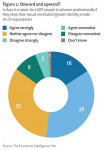Grain and oilseed prices will rise in 2007 but beverages will fall
Agricultural commodity prices, expressed in terms of the Economist Intelligence Unit's food, feedstuffs and beverages (FFB) index, are on course to rise by over 13% this year, compared with 2005. Prices have increased across all the different markets, with droughts in key production areas, surging biofuel demand and declining stocks all contributing to the synchronised upswing.
In 2007 the fortunes of the different markets will start to vary. Further price increases in the grain and oilseed markets will be offset by declines in the sugar and beverages market, and the overall FFB index will show no change in 2007. The key wheat and maize markets are becoming tighter following poor crop outturns in Australia and other large producers. Buoyed by strong demand and low stocks, the grain index will see a further (albeit nominal) increase in 2007, followed by a stronger 5% rise in 2008.
The oilseeds market is at a turning point: the middle of 2006 has proved to be the trough for the market, with prices now beginning to rise as stocks stop climbing. Large investments in biodiesel capacity and strong demand for feed/food use has absorbed the stock overhang, while weather conditions have resulted in smaller crops. These trends will manifest themselves even stronger next year, pushing the oilseeds index up by nearly 5%. The higher price environment will trigger a large supply response thereafter and in 2008 prices will stabilise.
· The beverages index will fall in 2007 as the supply response should be overwhelmingly positive after five years of rising prices. The tea, cocoa and coffee markets are all running into surpluses and, as stocks build up, this will be reflected in a decline in prices of around 5% in both 2007 and 2008. However, the forecasts could be derailed by a renewal of Côte d'Ivoire's civil war or arrival of the El Niño weather system·both of which could seriously alter production, and thereby price, prospects.
· After the spectacular rise of sugar prices this year, there will be a small correction in 2007. Prices have already weakened recently on the back of softer energy prices (which influence ethanol demand), and a sell-off in the futures market. As the market slowly moves out of deficit (but not necessarily into a full surplus), prices will drop by 10% in 2007, followed by a modest upturn in 2008.
For specific commodities, the Economist Intelligence Unit’s current forecasts are:
Cocoa: As production continues to outstrip growth in demand, surpluses are expected to persist in 2007/08 and 2008/09. Upside risks, however, include a renewal of Côte d'Ivoire's civil war and the possibility of El Niño affecting production plans.
Coffee: Supply of both arabicas and robustas will be running ahead of demand for the foreseeable future, but not excessively. The Economist Intelligence Unit does not foresee a significant decline in prices over the next few months.
Grains: Wheat will be in short supply in 2006/07 after disappointing harvests, but high prices will encourage a recovery in output in 2007. Maize usage is overtaking supply, and an exceptionally big US crop will be needed in 2007 to meet domestic and export demand. Indonesia’s unexpected purchases have helped to lift rice prices, but world demand and supply will remain in balance. Barley supply, particularly of malting qualities, will be tight in 2006/07, easing slightly in 2007/08.
Oilseeds: The vegetable oils market is in transition from the oversupplied market of 2005/06 to one where significant reductions in both oils and oilseeds stocks are expected. Steadily increasing prices are likely during 2006/07 unless prospects for southern hemisphere crops deteriorate markedly or plantings of northern hemisphere crops decline (should farmers switch to more lucrative grain crops). While demand for vegetable oils for biodiesel grabs the headlines, the underlying demand for the much larger food market remains robust.
Sugar: Prices are falling, but competition for cane from the ethanol sector (not only in Brazil) and recent less attractive sugar export prices may slow the expansion in supply at a time when the market needs to provide an extra 3m tonnes of sugar for consumption each year.
Tea: Our current forecast is more or less for a “steady as she goes” scenario but with the bias towards lower prices·unless weather conditions deteriorate. After a modest deficit this year, modest surpluses in 2007-08 will keep the market subdued.
About the Economist Intelligence Unit
The Economist Intelligence Unit, the business information arm of The Economist Group, publisher of The Economist, is the world's leading provider of country intelligence, with over 500,000 customers in corporations, banks, universities and government institutions. Our mission is to help companies do better business by providing timely, reliable and impartial analysis on market trends and business strategies.
웹사이트: http://www.eiu.com
연락처
Edgar Fernandez
Marketing Manager, Asia-Pacific
(852) 2585 3826 이메일 보내기
Fax: (852) 2802 7007
이 보도자료는 Economist Intelligence Unit가(이) 작성해 뉴스와이어 서비스를 통해 배포한 뉴스입니다. 뉴스와이어는 편집 가이드라인을 준수합니다.




